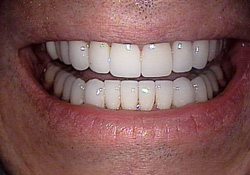Do Veneers Need to Be Replaced?
Porcelain veneers will last 12 to 25 years, depending on your level of care and maintenance. This is longer than the lifespan of composite veneers. Avoiding hard food may prolong the life of your porcelain veneers and prevent structural damage.
If you’re paying for a cosmetic dentistry procedure and your smile is on the line, you want to make sure that you’re getting a good value for your investment, and one that lasts for a good amount of time without complications or hassles. Fortunately, dental veneers are one of the most striking and effective cosmetic dental procedures available to improve your smile, and they truly work.
Many of our readers may be unfamiliar with the exact nature of veneers, however, so let’s address two basic topics before we answer the big question on how long dental veneers last for users.
How Long Do Veneers Last Normally?
Porcelain veneers definitely last longer than composite veneers – up to three times as long according to some sources. Composite veneers also have the potential to chip at times and must then be repaired, while porcelain veneers rarely need maintenance once they have been applied to a patient’s teeth. Normally, composite resin veneers will last four to eight years for most patients. There are also a variety of veneer care and maintenance factors that can help extend their life and beauty.
Porcelain veneers will last 12 to 25 years – quite a difference in terms of longevity, though porcelain veneers are a more prudent investment in a patient’s mouth.
What Exactly Are Dental Veneers Anyway?
Have you ever seen those commercials for kitchen remodeling systems, the technique where old cabinet doors and drawer fronts are replaced with new doors and drawers for a bright, fresh-looking appearance in the kitchen? Dental veneers work in a similar fashion, except that your teeth are not removed when veneers are applied. Instead, our veneers cover the fronts of your teeth to present a pearly white, straight, well-formed set of teeth for a perfect smile and a more healthy appearance. You can see for yourself how effective our dental veneers are by viewing our veneers procedure page.
A better analogy is probably cosmetic fingernails, which are applied atop your existing fingernails but which are stronger, longer, and can be shaped to enhance the appearance of your fingers.
[baslider name=”PorcelainVeneers”]
Our dental veneers are also glued to adhere to the fronts of your teeth, much like artificial fingernails are affixed to your real fingernails, and each veneer is actually shaped to match each specific tooth in your smile for a very personal smile expression.
Cleveland Smiles, as well as other technologically advanced cosmetic dental practices, use digital impression machines to create extremely accurate and pain-free oral impressions for the veneers. Watch the video below for an in-depth explanation by Dr. Marsh DDS.
What Are Dental Veneers Made or Composed of?

Veneers for teeth today are made out of porcelain or out of a composite engineered plastic or resin. Porcelain veneers tend to be stronger, look more natural, and also are not porous after they have been glazed, so they will not stain with use. Composite veneers can and will stain with use over the years due to the nature of the resin used in their construction.
They also tend to absorb small amounts of water over time, and need to be polished intensely to have a truly natural appearance. Their “advantage” is that less tooth reduction is necessary in order to place them upon the teeth.
Veneers for teeth can be installed in either a direct or an indirect application. The indirect process requires two visits to the Dr. Marsh’s or your local cosmetic dentist’s office – the first to remove a small layer of enamel from teeth and also to make impressions of all the teeth that will be fitted with the dental veneers. The second visit is when the veneers are applied to the teeth for the new, bright appearance.
Both composite and porcelain veneers can be applied via the indirect process. The direct process works only for composite veneers, as these plastic/enamel veneers are actually sculpted by Dr. Marsh and applied during the sole office visit.
Our office prefers porcelain veneers for our patients, as they are stronger and last longer and also because they are created via digital impressions at our office for greater accuracy and a more natural appearance. Our dental laboratories, including Dental Ceramics in Cleveland and Da Vinci in Los Angeles, use both Feldspathic Porcelain and Empress E-max porcelain for most of our dental veneers; this porcelain material is beautiful to look at and is also three times stronger than other porcelains on the market. Only the best for our patients!
If you are interested in dental veneers, either for yourself or for a loved one, you can schedule an appointment to discuss veneers with Dr. Marsh by contacting us here today.

It really’s challenging to choose the decent dental service, yet after reading through, this article it made me realize a lot and I will definitely attempt to stick to your tips down the road.